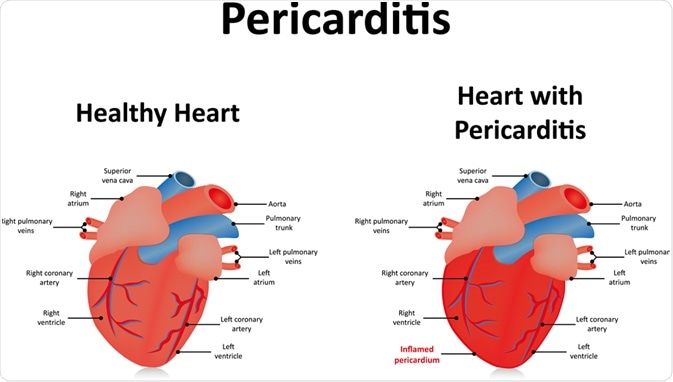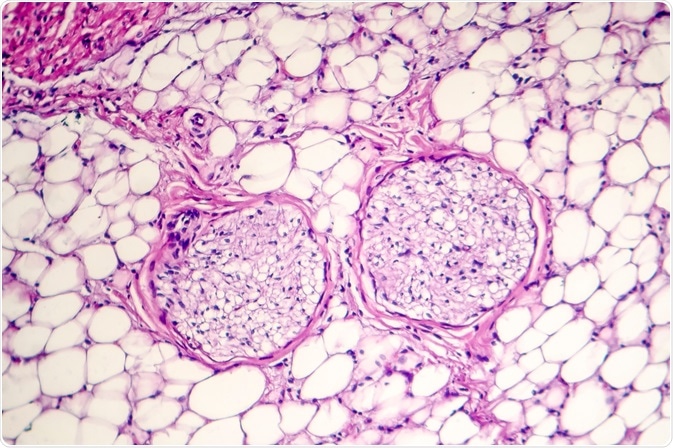The inflammation or infection that occurs in the pericardium is called pericarditis. Inflammation of the pericardial layers ensues when the membrane gets thickened and the layers rub against each other. In this condition, if the fluid volume in the pericardial sac increases, it leads to compression of the heart. This subsequently affects the functioning ability of the heart.
The main symptom of pericarditis is chest pain. It is generally not considered a life-threatening situation, and patients may return to normal in a few days or weeks (although in some instances the symptoms may linger for several months). It is a relatively common heart condition and around 5% of accidents with severe chest pain are diagnosed as pericarditis. Moreover, it is more common in men than in women and it affects people of all ages but is mostly seen in young adults.
There are several types of pericarditis based on the causes and symptoms.
 Pericarditis diagram. Image Credit: joshya / Shutterstock.com
Pericarditis diagram. Image Credit: joshya / Shutterstock.com
Pericarditis Based on Symptoms
Acute pericarditis
Acute pericarditis is when chest pain develops suddenly (often radiating to the neck, shoulders, and back), it is termed as acute pericarditis. The pain often increases during inspiration (when breathing in) and while lying down but decreases when one sits up. The symptoms may last for less than three months, and may often get resolved in a few days with appropriate treatment.
Pericarditis may be idiopathic (unknown), or it may be due to viral/bacterial infection, metabolic disorders, cardiac arrest, or a blunt injury. It can also be caused by radiation, malignancy, toxins, trauma, or as a side effect of certain drugs.
Chronic pericarditis
Sometimes, the condition persists over a period of time and the symptoms last longer than three to six months. In such cases, the patient may not have the typical chest pain but may experience tiredness, shortness of breath, and coughing. Chronic pericarditis is believed to be the result of some autoimmune disorders such as lupus, scleroderma, and rheumatoid arthritis, where the antibodies produced by the body attack its own cells and tissues.
Recurrent pericarditis
When a person has repeated episodes of pericarditis, it is termed recurrent pericarditis. This leads to a debilitating condition and has to be treated carefully, depending on the cause.
 Light micrograph of pericarditis - inflammation of the heart pericardium. Image Credit: Kateryna Kon / Shutterstock.com
Light micrograph of pericarditis - inflammation of the heart pericardium. Image Credit: Kateryna Kon / Shutterstock.com
Pericarditis Based on Causes
Constrictive pericarditis
When the pericarditis is associated with a thickening or scarring of the pericardial layers, this starts constricting the heart within the thoracic cavity, which in turn limits its effective functioning. This condition is known as constrictive pericarditis.
Pericardial effusion
In a normal person, the pericardial cavity is filled with about 20–50 ml of fluid. Sometimes, in patients with specific medical conditions (for example, severe hypothyroidism or kidney failure), or in those who have undergone invasive cardiac procedures, there may be a gradual accumulation of fluid within the pericardial cavity.
Such gradual fluid accumulation may often be asymptomatic until the surrounding structures (lung, stomach, phrenic nerve) start getting compressed, in which case symptoms related to such compressions (for example, dyspnea, nausea, fullness of the abdomen) may manifest.
Cardiac tamponade
Steady pericardial effusion can cause the pericardial fluid volume to increase up to 80 ml, or even 200 ml. Such high rises in the pericardial fluid volume can lead to malfunction of the pericardium; therefore, this condition has to be treated as an emergency.
Viral pericarditis
Viruses that may cause viral pericarditis include coxsackieviruses, influenza virus, agents of viral enteritis, human immunodeficiency virus (HIV), and echovirus. Infection in the upper airways is the early symptom upon the onset of this ailment. This kind of pericarditis is simple and can be handled as an outpatient procedure.
Purulent pericarditis
This is a rare disease caused by aerobic and anaerobic bacteria. Before the discovery of antibiotics, pneumonia was believed to be the main cause of this infection. Recent studies show that procedures such as surgery in the chest region, hemodialysis, immunosuppression, and chemotherapy are dominant causes that lead to this type of pericarditis.
Pericarditis and pericardial effusions - causes, symptoms, diagnosis, treatment, pathology
Tuberculous pericarditis
This condition is also seen in a very minor percentage of patients having pulmonary tuberculosis. Some of the developing countries remain the leading risk groups of tuberculous pericarditis. Another population at risk is HIV-positive patients. There is a gradual progression in symptoms of night sweats, dyspnea, fever, and chill, but any suspected patient needs to be given emergency treatment in the hospital.
Radiation Pericarditis
This type of pericarditis is caused due to recent mediastinal radiation at any time from weeks to months after the exposure.
Traumatic pericarditis
Sharp or blunt trauma causes traumatic pericarditis. Invasive cardiac procedures also may give rise to this type of pericarditis, which includes cardiac diagnostic catheterization and electrophysiological ablation procedure.
Malignancy
Malignancy pericarditis is mainly caused by metastatic (i.e. spread of cells to new areas of the body) disease. It is common in metastasized bronchogenic or breast carcinoma, Hodgkin’s disease and lymphoma, albeit it is rare in primary mesothelioma and angiosarcoma.
References
Further Reading
Last Updated: Feb 5, 2021